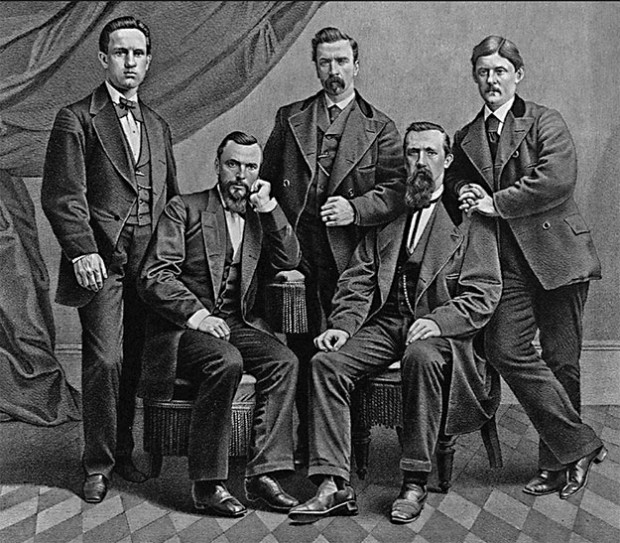5 January 2016
On This Day – Fenian prisoners’ amnesty, 1871

● ‘The Cuba Five’ – John Devoy, Jeremiah O’Donovan Rossa, Charles Underwood O’Connell, Henry Mulleda and John McClure
IN EARLY JANUARY 1871, almost four years after the ending of the ill-fated Fenian Rising, a general amnesty saw the release of the majority of the state (political) Fenian prisoners imprisoned in various English jails.
Throughout the early part of 1869, a major drive for an amnesty for the Fenian prisoners gathered momentum. The Amnesty Association founded by John ‘Amnesty’ Nolan the previous year to campaign for the release of almost 100 political prisoners (held since the raid on the offices of the Fenian newspaper in September 1865, the ill-fated rising in March 1867, and the Manchester rescue of September 1867) held rallies throughout Ireland and England.
The prisoners, who included senior members of the Irish Republican Brotherhood such as Jeremiah O’Donovan Rossa, John Devoy, John O’Leary and Thomas Clarke Luby (who were serving sentences of 20 years’ imprisonment) were held in various jails in England, including Pentonville, Millbank, Portland, Dartmoor, Chatham and Woking prisons.
In mid-December 1870, as a result of the agitation of the Amnesty Association, which attracted the support of many influential nationalists throughout Ireland (and saw the release of several dozen Fenian prisoners since their campaign began), William Gladstone, the British Prime Minister, announced that the majority of the remaining political prisoners were to be freed in a general amnesty. All but those most recently imprisoned, who included Michael Davitt, would be released.
Several days later, 33 of the prisoners (who had endured appalling conditions in the various prisons over the years) were told that they were to be freed but only on condition that they exiled themselves to a country of their choice and did not return to Britain or Ireland until the term of their sentence had expired.
EXILED
On a cold winter’s morning in early January 1871, with snow thick on the ground, the Fenian prisoners were taken under heavy police and military escort to Liverpool and other ports to be shipped to their country of exile. Some chose to go to Australia while others (including O’Donovan Rossa, Devoy, John McClure, Henry S. Mulleda and Charles Underwood O’Connell, released from Chatham Jail) opted to go to America.
O’Donovan Rossa and the other four Chatham prisoners (who became known as the “Cuba Five”), having said farewell to William Halpin, one of those not being released, were taken to Liverpool docks and from there by a steamship, the SS Cuba, to Cork harbour. Reunited with their families, they were shipped to America.
On arrival in New York after their long journey they received a tumultuous reception from the city’s Irish population and a resolution of welcome was passed by the United States House of Representatives. All five became actively involved in the Fenian movement in America during the following years.
Thirty-three Fenian prisoners were released in a general amnesty on 5 January 1871.
Follow us on Facebook
An Phoblacht on Twitter
Uncomfortable Conversations

An initiative for dialogue
for reconciliation
— — — — — — —
Contributions from key figures in the churches, academia and wider civic society as well as senior republican figures




